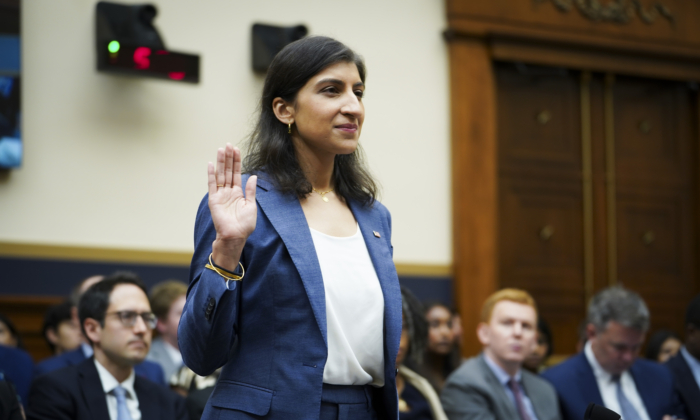Lina Khan said Democrats and Republicans cooperated on competition and consumer protection during her tenure.
Lina Khan, the departing chair of the Federal Trade Commission, said that Democrats and Republicans cooperated on some competition and consumer protection issues during her tenure, including on Big Tech.
“There has been this bipartisan concern about what happens when we allow markets to become very dominated by fewer companies,” Khan said during a Jan. 8 conversation at the Brookings Institution in D.C. when asked about red state attorneys general joining FTC actions.
“We had a bipartisan coalition join our lawsuit taking on Amazon,” she noted.
The FTC’s 2023 lawsuit, which accused the tech giant of using illegal means to maintain a monopoly, was joined by various states, including deep-red Oklahoma.
A 2022 lawsuit against pesticide makers Syngenta Crop Protection and Corteva, Inc., drew support from Indiana, Texas, Iowa, and Nebraska, among other states.
In December, President-elect Donald Trump announced that Khan would be replaced by Andrew Ferguson, who became an FTC commissioner in April 2024 alongside Melissa Holyoak, another Republican.
In a Truth Social post announcing his pick, Trump said Ferguson had a “proven record of standing up to Big Tech censorship.” He also named Mark Meador, an antitrust attorney and Heritage Foundation fellow, as the other Republican to join the commission.
Many Republicans have been critical of Khan’s leadership of the FTC.
During a 2023 Senate nominations hearing, Sen. Ted Cruz (R-Texas) said the outgoing chair “has taken the FTC wildly off course and pursued a plainly partisan agenda well outside the agency’s legal authority and mission,” noting that he once worked for the FTC on policy planning.
An October 2024 report from staff of the House Oversight Committee, which is led by Rep. James Comer (R-Ky.), concluded Khan had “undermined the FTC’s mission through a relentless violation of legal, procedural, historical, and management norms,” criticizing the agency for preventing the merger of Amazon with the consumer robotics firm iRobot.
Khan and Jonathan Kanter, who led antitrust efforts at the Department of Justice under Biden, have also earned praise from Make America Great Against (MAGA) stalwart and former Rep. Matt Gaetz, the president-elect’s initial choice for attorney general.
During a 2023 hearing, for example, Gaetz described Khan as “a brilliant woman with a tremendous ability to impact how consumers are going to interface with the digital world for a long time to come.”
Former Florida Attorney General Pam Bondi, Trump’s new attorney general pick, also has a reputation for tackling Big Tech’s effect on the market. During her tenure, the State of Florida signed onto an investigation of Google’s search practices for which the Department of Justice recently filed a proposed final judgment.
Bondi’s handling of the ongoing Google case “will be a major decision for the Administration in its first 100 days, and an indication of which side Bondi intends to align herself with in the longer term,” analyst Josh Tzuker of FGS Global wrote in an analysis of the incoming Trump team’s stance on antitrust.
The president-elect appears to be friendlier to Big Tech than he was several years ago, when Twitter and many other sites were banning him.
Trump has frequently appeared alongside SpaceX CEO and major campaign donor Elon Musk and, during late December, defended the H-1B visas used by many tech firms, a target of his criticism in 2016.
Additionally, in recent weeks, Amazon, Meta, OpenAI, and other tech giants have made significant contributions to Trump’s inaugural fund—and Meta CEO Mark Zuckerberg recently revealed his company would replace fact checkers with X-style Community Notes in an announcement criticizing government censorship under the Biden administration and pledging to work with the president-elect to promote free speech worldwide.
“I think they’ve come a long way,” Trump said of Meta’s announcement during a Jan. 7 press conference at Mar-a-Lago.

